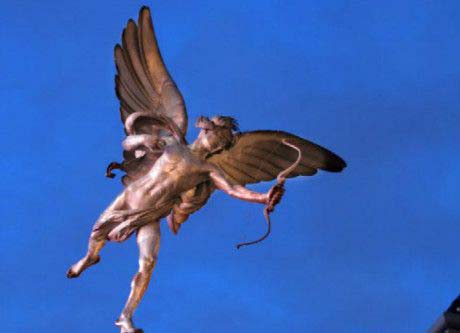Eros: Towards a Depth Psychology of Relationship

Moving into Fall, our culture celebrates events that emphasize the importance of the psychology of relationship. Does /a-midlife-transition, in particular, have anything important to say to us about connection to others?

EROS – God of connection and relationship
Canadians celebrate Thanksgiving in early October, Hallowe’en comes at the end of the month, and the lead-up to Christmas soon follows. It’s the season of connection, it seems. But in the 21st century the meaning of relationship and connection has shifted dramatically. Can depth psychology help us make sense of all this?
Relationship is Changing

At this time of year, case studies clients start to talk to me about Thanksgiving and Christmas festivities. They wonder how they’re going to organize things with their complex family situations.
They face many of the demanding situations of modern day family life: dealing with holidays in the aftermath of marital breakup; addressing issues of blended families after re-marriage; facing complex issues that used to go unacknowledged, such as family members “coming out”, homophobic relatives, close relatives who have been abusive, or family members struggling with addictions issues.
As a culture, we are conscious of different things than we used to be. Relatives can be distant or alienated from each other, and it can be hard to know how to have them in the same room during holiday and festive occassions
For many, connection with family isn’t simple or straightforward. In our fast-moving age, the same can be true of friends.
Individuality and the Meaning of Relationship / Connection
We live in the era of triumphant individualism. Once, blood connection between people was a secure bond. Not now. Many today experience increasing alienation and isolation. Our culture often promotes a ruthless self-sufficiency that flies in the face of vulnerability and relatedness.
This is very true for men, but also for women, as they adopt more and more masculinized social roles.
Individuation, Individualism, Eros and the Psychology of Relationship

Our culture promotes individualism, which is not the same thing as individuation. Individualism promotes self-reliance, even suspicion of others, and a very robust kind of self-interest. Depth case studies, after Jung, emphasizes the psychological need for individuation, which is the process of more and more uncovering your own individual identity. However, individuation includes the dimension of Eros: the development of empathy and discovering how I can connect to others.
Eros is involved in sexual love, but it is much broader than that. Psychiatrist and Jungian Analyst Adolf Guggebbuhl-Craig speaks of Eros as the attribute that makes Gods and humans loving, creative and involved.
To get to an authentic, creative, and life-giving connection with others, we have to understand our individual selves, who we are drawn to, and with whom we really want to be connected. Such intentional connection goes far beyond the old saying that “blood is thicker than water.”
The Divinity of Eros
Greeks made Eros a God, recognizing the great power and necessity of this dimension of human life. Similarly, we can’t afford to ignore our own need for meaningful connection with others. We cannot afford to “offend the God”, as the Greeks would say. Eros — true human connection — is centrally important to our journey toward wholeness.
Yet we can’t force our Eros to go where it won’t, or force others to be what they’re not. In our time, when “compulsory” connection with others is breaking down, we need to be resourceful, creative and intentional about connection with others. Just how we do that matters for our individual journey — and is the subject of our next post.
Brian Collinson, Registered Psychotherapist & Jungian Analyst
[cta]
PHOTOS: 
 © Ben Salter ; Bev Sykes ; Eugene Kim
© Ben Salter ; Bev Sykes ; Eugene Kim
© 2015 Brian Collinson, 2238 Constance Drive Oakville, Ontario (near Mississauga)
